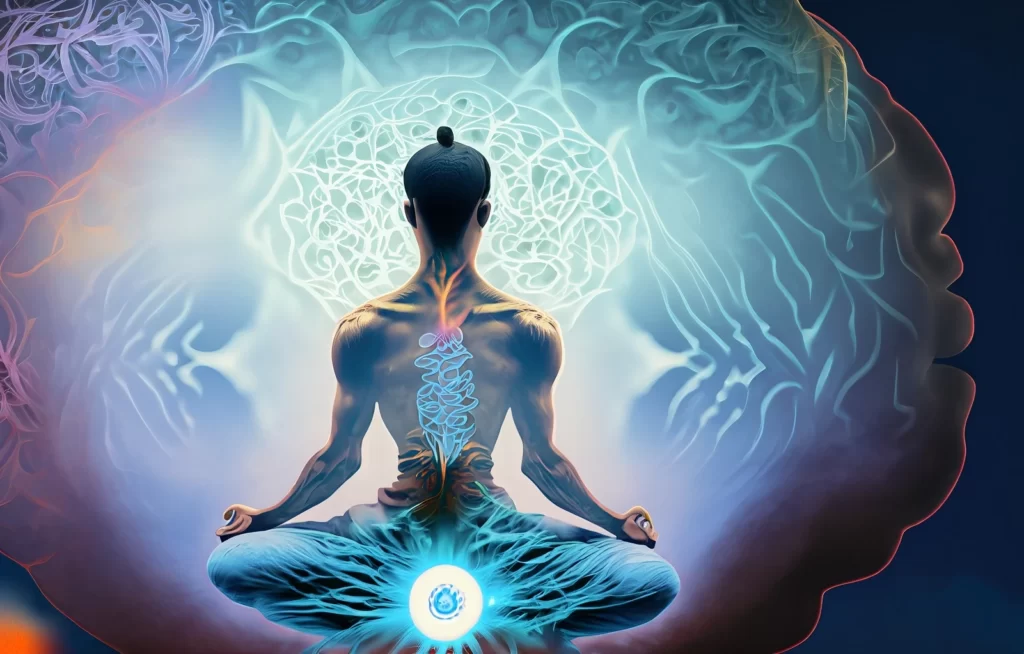The Science Behind Meditation: How It Impacts the Brain and Body
Meditation has been practised for centuries to cultivate inner peace, enhance well-being, and promote self-discovery. In recent years, scientific research has delved into the effects of meditation on the brain and body, revealing a wealth of benefits beyond its spiritual and philosophical roots. This article explores the fascinating science behind meditation and how it impacts the brain and body.

What is Meditation?
Meditation is a practice that involves training the mind to achieve a state of focused attention and heightened awareness. It encompasses a variety of techniques, but the common goal is to cultivate a sense of presence and inner stillness.
Meditation can be practiced in many forms, such as mindfulness meditation, transcendental meditation, loving-kindness meditation, and guided visualization. Regardless of the specific technique, meditation redirects the mind’s attention away from external distractions and toward a chosen focal point.
The Effects of Meditation on the Brain
Changes in Brain Structure
Scientific studies using neuroimaging techniques, such as MRI scans, have shown that regular meditation can lead to structural changes in the brain.
One area that undergoes significant changes is the prefrontal cortex, which is responsible for executive functions such as decision-making, attention, and self-control. Meditation strengthens the neural connections in this region, enhancing cognitive abilities and emotional regulation.
Neuroplasticity and Brain Function
Meditation also promotes neuroplasticity, the brain’s ability to reorganize and form new neural connections. It stimulates the growth of neurons and increases the density of grey matter in specific brain regions associated with memory, learning, and emotional processing. These changes contribute to improved cognitive function, increased resilience to stress, and enhanced overall brain health.
Regulation of Emotions
Another significant effect of meditation on the brain is its impact on emotional regulation. Research has shown that regular meditation can reduce activity in the amygdala, the brain’s fear center, while strengthening the connections between the amygdala and prefrontal cortex. This leads to more excellent emotional stability, reduced reactivity to stressors, and an increased ability to respond to challenging situations calmly and clearly.
The Effects of Meditation on the Body
Stress Reduction
One of the most well-known benefits of meditation is its ability to reduce stress. When we experience stress, the body releases hormones like cortisol and adrenaline, which can harm our health when chronically elevated. Meditation activates the body’s relaxation response, triggering the release of endorphins and other calming neurotransmitters that counteract the stress response. Regular meditation practice can significantly lower stress levels and promote a sense of inner peace.
Improved Immune System Function
Research suggests that meditation can have positive effects on the immune system. Chronic stress weakens the immune system, making us more susceptible to illnesses. By reducing stress and promoting relaxation, meditation helps to restore balance in the immune system, enhancing its ability to fight off infections and maintain overall health.
Lowered Blood Pressure
High blood pressure is a risk factor for various cardiovascular diseases. Studies have shown that practising meditation can lead to a reduction in blood pressure levels. Meditation induces deep relaxation, which causes blood vessels to dilate and promotes better blood flow. By regularly practising meditation, individuals may experience a decrease in blood pressure and a reduced risk of hypertension-related complications.
Pain Management
Meditation can also be effective in managing chronic pain. Individuals can develop a better relationship with their pain sensations by directing focused attention and cultivating mindfulness. Meditation helps shift the perception of pain and reduces emotional distress. It can be a useful complementary approach to pain management, potentially reducing the reliance on medication and improving overall well-being.
How Meditation Works
Meditation operates through various mechanisms contributing to its transformative effects on the mind and body.
Attention Regulation
One of the fundamental aspects of meditation is attention regulation. By training the mind to focus on a specific object, such as the breath or a mantra, individuals learn to cultivate sustained attention and minimize distractions. This practice strengthens the neural circuits responsible for attention, enabling individuals to maintain focus and resist the lure of wandering thoughts.
Mindfulness and Awareness
Meditation cultivates mindfulness, which involves non-judgmental awareness of the present moment. It encourages individuals to observe their thoughts, feelings, and bodily sensations without getting entangled. This heightened awareness fosters self-reflection, insight, and a deeper understanding of one’s internal experiences.
Activation of the Relaxation Response
During meditation, the body enters a state of deep relaxation characterized by reduced physiological arousal and decreased sympathetic nervous system activity. This activation of the relaxation response counteracts the effects of chronic stress and promotes physical and mental well-being. The relaxation response is associated with lower heart rate, blood pressure, muscle tension, and increased feelings of calmness and tranquillity.
Different Types of Meditation
There are various meditation practices, each with its own focus and techniques. Here are a few commonly practised forms of meditation:
Mindfulness Meditation
Mindfulness meditation is a practice that involves directing one’s attention to the present moment with non-judgmental awareness. It cultivates a state of mindfulness, where individuals observe their thoughts, sensations, and emotions as they arise without getting entangled in them.

By focusing on the breath, bodily sensations, or other anchor points, mindfulness meditation helps individuals develop a deeper understanding of their internal experiences and promotes acceptance and self-compassion.
By training the mind to stay present and non-reactive, mindfulness meditation enhances overall well-being, reduces stress, and fosters a greater sense of calmness and clarity in daily life.
Transcendental Meditation
Transcendental Meditation (TM) is a widely practised technique that offers a unique approach to meditation. It involves using a silent mantra, a specific sound or phrase, repeated silently in the mind.
TM aims to settle the mind, leading to deep relaxation and inner stillness. Practitioners experience a transcendent state of consciousness, where the mind effortlessly transcends thought and experiences a heightened awareness.
This technique is known for its simplicity and accessibility, making it suitable for individuals of all ages and backgrounds. Transcendental Meditation is renowned for its potential to reduce stress, enhance clarity of mind, and promote overall well-being.
Loving-kindness meditation
Loving-kindness meditation is a practice that focuses on cultivating feelings of love, compassion, and goodwill towards oneself and others. Practitioners silently repeat phrases or intentions of kindness and direct them towards themselves, loved ones, neutral individuals, and even difficult people. This practice aims to develop a deep sense of connection, empathy, and understanding.
By intentionally generating feelings of love and kindness, individuals can foster a positive emotional state and enhance their relationships with others. Loving-kindness meditation promotes self-acceptance, compassion, and a sense of interconnectedness, offering profound benefits for overall well-being and emotional resilience.
Guided Visualization
Guided visualization is a practice that utilizes the power of imagination to create a transformative experience. In guided visualization, individuals listen to recorded audio or a live guide who leads them through vivid imagery and descriptions.
Following instructions, individuals mentally visualize specific scenes, situations, or outcomes. This practice engages the senses, emotions, and mental imagery to evoke a desired experience or outcome.
Guided visualization can be used for relaxation, personal growth, and manifesting goals. It taps into the mind’s ability to create and visualize, allowing individuals to access their inner resources, expand their imagination, and bring about positive change in their lives.
Meditation Techniques and Practices
There are various techniques and practices within the realm of meditation that individuals can explore to find what resonates with them. Here are a few commonly used methods:
Breathing Exercises
Breathing exercises form the foundation of many meditation practices. Techniques such as deep abdominal breathing, alternate nostril, or box breathing can help calm the mind, relax the body, and enhance focus.
Body Scan
The body scan technique systematically directs attention to different body parts, notices sensations, and cultivates bodily awareness and relaxation. It is a practice of grounding oneself in the present moment and connecting with the body’s senses.
Mantra Repetition
Repeating a mantra or a sacred word silently or aloud is a powerful technique in various meditation traditions. Repetitioning a word or phrase helps to still the mind and deepen concentration, allowing individuals to enter a state of profound relaxation and inner stillness.
Walking Meditation
Walking meditation combines the benefits of physical movement and meditation. It involves walking slowly and mindfully, paying attention to the sensations of each step, the direction of the body, and the surrounding environment. Walking meditation can be practised indoors or outdoors and uniquely integrates mindfulness into daily life.
Benefits of Regular Meditation Practice
Regular meditation practice has numerous benefits for overall well-being. Here are some of the significant advantages:
Reduced Anxiety and Depression
Studies have shown that meditation can be an effective tool in reducing symptoms of anxiety and depression. By cultivating mindfulness and promoting emotional regulation, meditation helps individuals develop a healthier relationship with their thoughts and emotions, reducing the impact of anxiety and depression on their daily lives.
Increased Focus and Concentration
Meditation strengthens the neural circuits responsible for attention and concentration. Regular practice enhances the ability to sustain focus, resist distractions, and stay present in the moment. This improved cognitive function can positively affect productivity, creativity, and overall mental clarity.
Improved Sleep Quality
Insomnia and sleep disturbances can significantly impact overall well-being. Meditation has been found to improve sleep quality and help individuals fall asleep faster. By inducing a state of relaxation and reducing the activation of the stress response, meditation promotes a calm and peaceful state conducive to restful sleep.
Enhanced Emotional Well-being
Meditation cultivates emotional resilience and stability. It helps individuals develop greater self-awareness, empathy, and compassion towards themselves and others. Meditation enhances overall emotional well-being and promotes healthier relationships by fostering a positive emotional state.
Integrating Meditation into Daily Life
To experience the full benefits of meditation, it is essential to integrate it into daily life. Here are some tips for establishing a regular meditation practice:
Creating a Meditation Routine
Set aside dedicated time each day for meditation. Start with shorter sessions and gradually increase the duration as you become more comfortable. Consistency is key, so find a time that works best for you and prioritize it in your daily routine.
Finding the Right Meditation Style
Experiment with different meditation styles to find the one that resonates with you. Choose a practice that aligns with your intentions and preferences, Whether mindfulness meditation, loving-kindness meditation, or any other technique.
Overcoming Challenges and Obstacles
Meditation is a practice that requires patience and persistence. Understand that thoughts and distractions will arise during meditation, and that’s normal. Instead of getting frustrated, gently bring your attention to the chosen focal point, whether it’s the breath, a mantra, or a visualization.
Conclusion
Meditation is a powerful tool for enhancing well-being and promoting self-discovery. The science behind meditation reveals its profound effects on the brain and body, from structural changes in the brain to improved emotional regulation and stress reduction.
By incorporating meditation into our daily lives, we can experience various benefits, including reduced anxiety and depression, increased focus and concentration, improved sleep quality, and enhanced emotional well-being.
So why not embark on a journey of self-exploration and start reaping the rewards of regular meditation practice?
FAQs
Q: What is the recommended duration for meditation sessions?
A: The duration of meditation sessions can vary depending on individual preferences and schedules. It is recommended to start with shorter sessions, around 10-15 minutes, and gradually increase the duration as you become more comfortable and experienced.
Q: Can anyone practice meditation?
A: Yes, anyone can practice meditation. Meditation is a versatile practice that can be adapted to suit individual needs and preferences. It does not require any specific beliefs or affiliations. Simply find a technique that resonates with you and commit to regular practice.
Q: How long does it take to experience the benefits of meditation?
A: The benefits of meditation can vary from person to person. Some individuals may notice immediate improvements in their well-being, while for others, it may take weeks or even months of regular practice to experience significant changes. Consistency and patience are key when it comes to meditation.
Q: Can meditation be used as a complementary therapy?
A: Yes, meditation can be a complementary therapy alongside conventional medical treatments. It is beneficial in managing various health conditions, such as anxiety disorders, depression, chronic pain, and high blood pressure. However, it is essential to consult with healthcare professionals for personalized advice.
Q: Is there a specific time of the day best for meditation?
A: The best time for meditation is subjective and can vary from person to person. Some individuals prefer to meditate in the morning to start their day with a clear and focused mind, while others find evening meditation helpful for relaxation and winding down. Choose a time that fits well into your daily routine and allows you to establish a consistent practice.



